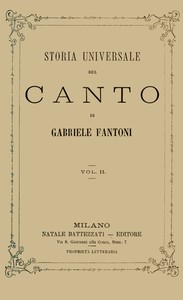Storia universale del canto, Vol. 2 (of 2) by Gabriele Fantoni
"Storia Universale del Canto, Vol. 2" by Gabriele Fantoni is a scholarly treatise on the art of singing written in the late 19th century. This volume focuses on the methodologies and educational systems of singing, tracing the evolution of vocal instruction and the renowned schools and masters in the field of music. The likely topic encompasses historical developments in vocal techniques, notable singers, and pedagogical approaches to enhance vocal mastery. The opening
of this work delves into the significant figures in the history of singing, specifically highlighting the contributions of Emanuele Garcia and his prestigious lineage in vocal pedagogy, including his daughter, the famous soprano Maria Malibran. Fantoni discusses various methods and schools associated with Garcia and others, critiquing their effectiveness and contributions to the vocal arts. He further critiques the imperfections and challenges faced by contemporary singing education, emphasizing the need for a thorough understanding of physiological aspects and a more personalized approach to instructing aspiring vocalists. Overall, the opening portion sets the stage for a comprehensive exploration of singing as an art form and its instruction across different eras and pedagogies. (This is an automatically generated summary.)
Read or download for free
| How to read | Url | Size | |||
|---|---|---|---|---|---|
| Read now! | https://www.gutenberg.org/ebooks/70632.html.images | 675 kB | |||
| EPUB3 (E-readers incl. Send-to-Kindle) | https://www.gutenberg.org/ebooks/70632.epub3.images | 380 kB | |||
| EPUB (older E-readers) | https://www.gutenberg.org/ebooks/70632.epub.images | 380 kB | |||
| EPUB (no images, older E-readers) | https://www.gutenberg.org/ebooks/70632.epub.noimages | 320 kB | |||
| Kindle | https://www.gutenberg.org/ebooks/70632.kf8.images | 595 kB | |||
| older Kindles | https://www.gutenberg.org/ebooks/70632.kindle.images | 550 kB | |||
| Plain Text UTF-8 | https://www.gutenberg.org/ebooks/70632.txt.utf-8 | 556 kB | |||
| Download HTML (zip) | https://www.gutenberg.org/cache/epub/70632/pg70632-h.zip | 344 kB | |||
| There may be more files related to this item. | |||||
Similar Books
About this eBook
| Author | Fantoni, Gabriele, 1833-1913 |
|---|---|
| Title | Storia universale del canto, Vol. 2 (of 2) |
| Original Publication | Italy: Battezzati, 1873. |
| Note | Reading ease score: 46.2 (College-level). Difficult to read. |
| Credits | Barbara Magni and the Online Distributed Proofreading Team at https://www.pgdp.net (This transcription was produced from images generously made available by Bayerische Staatsbibliothek / Bavarian State Library.) |
| Language | Italian |
| LoC Class | ML: Music: Literature of music |
| Subject | Singers |
| Subject | Vocal music -- History and criticism |
| Category | Text |
| EBook-No. | 70632 |
| Release Date | Apr 23, 2023 |
| Copyright Status | Public domain in the USA. |
| Downloads | 259 downloads in the last 30 days. |
| Project Gutenberg eBooks are always free! | |


